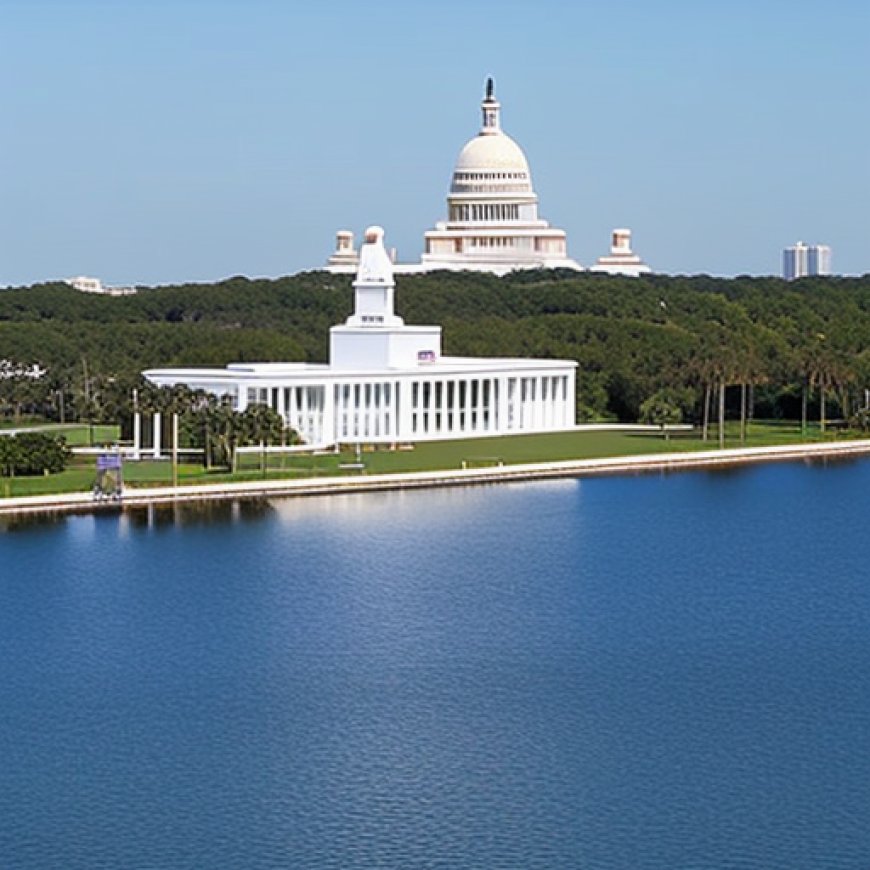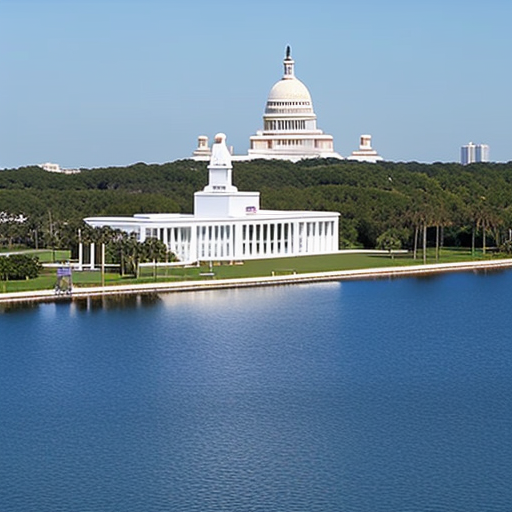DeSantis’ Controversial Policies Spark Florida Convention Cancellations—As Tourism Shows Signs Of Slowing
DeSantis’ Controversial Policies Spark Florida Convention Cancellations—As Tourism Shows Signs Of Slowing Forbes


Report: Conventions and Conferences Cancelled in Florida Due to Political Climate
Introduction
A growing number of conventions and conferences are refusing to hold events in Florida in response to the state’s political climate, as Republican Gov. Ron DeSantis and state lawmakers’ controversial policies involving LGBTQ rights and race have prompted a backlash that could hurt a key part of Florida’s economy—adding to a broader slowdown in tourism sectors like theme parks.
Key Facts
- At least five groups have canceled planned events in Orange County, where Orlando is located, or announced plans to hold them elsewhere, the Orlando Sentinel reports.
- Game of Thrones convention Con of Thrones canceled its event due to “the increasingly anti-humanitarian legislation and atmosphere in Florida,” for instance, while the National Society of Black Engineers moved its 2024 convention from Orlando to Atlanta, saying the state’s political climate “seeks to undermine what we stand for.”
- Tourism officials in Fort Lauderdale also report at least six organizations have pulled out of holding their events in Broward County, where the city is located, due to concerns about the state’s policies, local outlet 7News Miami reports.
- Local officials projected to the Wall Street Journal the cancellations would cost the county’s economy more than $20 million, taking into account lost revenue from hotel bookings, transportation, food and other travel costs.
- The Association of Collegiate Schools of Planning moved its conference from Miami to Chicago, saying it would pay a “steep penalty” for moving the event but members had expressed “significant concerns” about holding the event in Florida, particularly in light of the state’s controversial educational policies targeting diversity initiatives.
Sustainable Development Goals (SDGs)
- SDG 8: Decent Work and Economic Growth – The cancellations of conventions and conferences in Florida could negatively impact the state’s economy, particularly in the tourism sector, which contributes significantly to employment and economic growth.
- SDG 10: Reduced Inequalities – The decision to move events out of Florida due to concerns about the state’s political climate highlights the potential impact of discriminatory policies on marginalized communities, such as LGBTQ individuals and people of color.
- SDG 16: Peace, Justice, and Strong Institutions – The backlash against Florida’s controversial laws and policies reflects a desire for justice, inclusivity, and respect for human rights.
Tangent
There are broader signs tourism in Florida is on the decline—specifically in the Orlando area—though other factors besides politics are likely at play. The Orange County Comptroller’s office reported collections from a tourist development tax in May were down 6.7% from May 2022, after April tax figures were down by 3.5% from April 2022. That marks the first time there have been two consecutive decreases since February 2021, and hotel occupancy in the Orlando area in May was down 2.5% from a year earlier. Analysts cited by the Journal also report crowds in Walt Disney World over the July 4 holiday were the slowest they’ve been in nearly a decade, based on analysis of attraction wait times, a trend also hitting rival theme park Universal Orlando Resort. Those declines are at least partially because of families transitioning away from theme parks as pent-up demand following Covid-era closures has subsided, the Journal notes, and could also be a sign of visitors souring on widespread price increases at Disney’s theme parks.
Big Number
$7.75 billion. That’s Florida’s projected hotel revenue from business travel in 2022, according to the American Hotel and Lodging Association, part of $255 billion in business travel spending recorded nationwide in 2022 by the U.S. Travel Association. Conventions and conferences make up a sizable portion of Florida’s tourism economy, which contributed $96.5 billion to the state’s GDP in 2019 and employed 1.7 million people as of 2021, according to Visit Florida. Analysts cited by the Journal note Orlando is one of the top three cities in the country in terms of convention attendance and hotel rooms booked for conventions, and Visit Lauderdale told the publication that group travel including conventions makes up one-quarter of Broward County’s tourism business.
Chief Critic
Redfern directed Forbes to a Bloomberg article reporting Florida is among six Southern states that are “contributing more to the national GDP than the Northeast,” adding that under DeSantis’ leadership, “Florida’s economy is booming, with Florida being the fastest growing state and having the largest net domestic in-migration.”
Contra
Not all regions of the state are being affected by a drop in conventions and conferences, with officials in Tampa telling the Florida Phoenix that no events have yet been canceled at the city’s convention center for political reasons.
What To Watch For
How the state’s tourism figures will play out from here. In the near term, Visit Orlando told the Orlando Sentinel that hotel bookings suggest the city will have similar tourist levels to 2022 through the summer, and tax collection data from June is expected to be higher due to an uptick in conventions. Any major hit to Florida’s tourism industry as a result of conventions getting canceled is likely to be a longer-term trend, as many of the events pulling out of Florida were scheduled for next year and organizers often plan events years ahead of time. “In Greater Fort Lauderdale, we have seen record tourism numbers through the first quarter of this calendar year, but as I said, group business books years in advance,” Visit Lauderdale CEO Stacy Ritter told 7News.
Key Background
DeSantis and the Florida legislature have enacted a variety of controversial laws that have drawn national controversy, including restrictions on school instruction and classroom library books, bans on gender-affirming care, immigration restrictions, a six-week abortion ban and restrictions on drag shows. The state also publicly railed against an AP African-American Studies course for teaching “woke” politics, drawing backlash. Florida’s Parental Rights in Education law, known by critics as “Don’t Say Gay,” has led to a protracted battle between Disney and DeSantis after the company opposed the law, which is now playing out in court. The rash of policies has led to multiple civil rights groups issuing travel advisories against the state, including the NAACP, LGBTQ rights group Equality Florida and the League of United Latin American Citizens, urging Americans not to travel to Florida due to its “hostile” policies. “Florida is openly hostile toward African Americans, people of color and LGBTQ+ individuals,” the NAACP’s travel advisory states. “Before traveling to Florida, please understand that the state of Florida devalues and marginalizes the contributions of, and the challenges faced by African Americans and other
SDGs, Targets, and Indicators Analysis
1. Which SDGs are addressed or connected to the issues highlighted in the article?
- SDG 8: Decent Work and Economic Growth
- SDG 10: Reduced Inequalities
- SDG 16: Peace, Justice, and Strong Institutions
The article discusses how the political climate in Florida, particularly the controversial policies involving LGBTQ rights and race, is causing a backlash and potentially impacting Florida’s economy, specifically the tourism sector. These issues are connected to SDG 8, which aims to promote sustained, inclusive, and sustainable economic growth, full and productive employment, and decent work for all. They are also connected to SDG 10, which aims to reduce inequalities within and among countries. Additionally, the article mentions the state’s controversial educational policies targeting diversity initiatives, which relates to SDG 16, which focuses on promoting peaceful and inclusive societies for sustainable development.
2. What specific targets under those SDGs can be identified based on the article’s content?
- SDG 8.9: By 2030, devise and implement policies to promote sustainable tourism that creates jobs and promotes local culture and products.
- SDG 10.3: Ensure equal opportunity and reduce inequalities of outcome, including by eliminating discriminatory laws, policies, and practices and promoting appropriate legislation, policies, and action in this regard.
- SDG 16.7: Ensure responsive, inclusive, participatory, and representative decision-making at all levels.
Based on the article’s content, the specific targets that can be identified are SDG 8.9, which focuses on promoting sustainable tourism that creates jobs and promotes local culture and products. The article highlights how the political climate in Florida is impacting the tourism sector, potentially leading to event cancellations and economic losses. SDG 10.3 is also relevant as it emphasizes the need to reduce inequalities of outcome and eliminate discriminatory laws and policies. The article mentions the controversial policies involving LGBTQ rights and race, which can be seen as discriminatory and contribute to inequalities. Lastly, SDG 16.7 is relevant as it calls for inclusive and representative decision-making. The article discusses how the state’s political climate seeks to undermine certain values and initiatives, indicating a lack of inclusivity in decision-making processes.
3. Are there any indicators mentioned or implied in the article that can be used to measure progress towards the identified targets?
- Indicator for SDG 8.9: Number of jobs created in the tourism sector and the promotion of local culture and products.
- Indicator for SDG 10.3: Existence of discriminatory laws, policies, and practices, and efforts to eliminate them.
- Indicator for SDG 16.7: Level of inclusivity and representation in decision-making processes.
The article does not explicitly mention specific indicators related to the identified targets. However, potential indicators that can be used to measure progress towards these targets include the number of jobs created in the tourism sector and the extent to which they promote local culture and products (indicator for SDG 8.9). Additionally, the existence of discriminatory laws, policies, and practices can be measured, along with efforts to eliminate them (indicator for SDG 10.3). The level of inclusivity and representation in decision-making processes can also be assessed to measure progress towards SDG 16.7.
SDGs, Targets, and Indicators Table
| SDGs | Targets | Indicators |
|---|---|---|
| SDG 8: Decent Work and Economic Growth | 8.9: By 2030, devise and implement policies to promote sustainable tourism that creates jobs and promotes local culture and products. | Number of jobs created in the tourism sector and the promotion of local culture and products. |
| SDG 10: Reduced Inequalities | 10.3: Ensure equal opportunity and reduce inequalities of outcome, including by eliminating discriminatory laws, policies, and practices and promoting appropriate legislation, policies, and action in this regard. | Existence of discriminatory laws, policies, and practices, and efforts to eliminate them. |
| SDG 16: Peace, Justice, and Strong Institutions | 16.7: Ensure responsive, inclusive, participatory, and representative decision-making at all levels. | Level of inclusivity and representation in decision-making processes. |
Behold! This splendid article springs forth from the wellspring of knowledge, shaped by a wondrous proprietary AI technology that delved into a vast ocean of data, illuminating the path towards the Sustainable Development Goals. Remember that all rights are reserved by SDG Investors LLC, empowering us to champion progress together.
Source: forbes.com

Join us, as fellow seekers of change, on a transformative journey at https://sdgtalks.ai/welcome, where you can become a member and actively contribute to shaping a brighter future.







